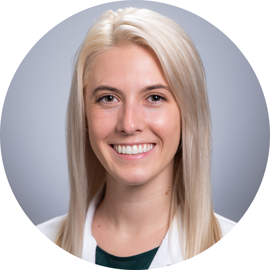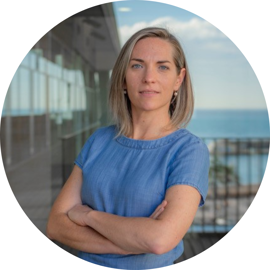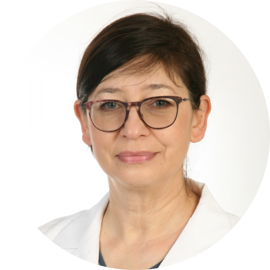|

Dr Rachael Guenter
|
Dr Rachael Guenter, B.S., PhD, is an Instructor at The University of Alabama at Birmingham (UAB) and co-leader of the UAB Neuroendocrine Cancer Surgery Lab. A Chemical and Biomolecular Engineering graduate from NC State University, she earned her PhD under Dr. Herbert Chen's guidance. With postdoctoral training completed in 2023 under Dr. Bart Rose, her research zeroes in on Notch signaling in neuroendocrine cancer and novel theranostic techniques. As the NETCF Research Ambassador, she ardently champions neuroendocrine cancer awareness. |
|

Dr Talya Dayton
|
Dr Talya L. Dayton, Ph.D., is a Group Leader at EMBL's tissue biology unit in Barcelona. She earned her Ph.D. from MIT, researching metabolism and cancer with Tyler Jacks and Matthew Vander Heiden. In Hans Clevers' lab at the Hubrecht Institute, Talya introduced tumor organoids for pulmonary neuroendocrine tumors. At EMBL, Talya's work uses these organoid models to study human disease mechanisms, including cancer progression and drug response. |
|

Dr Po Hien Ear
|
Dr Po Hien Ear, Ph.D., has significantly advanced our understanding of cellular biology and metabolic changes during stress conditions through her extensive research at Université de Montréal, McGill University, Harvard Medical School, and University of Iowa. Beginning with protein sensor engineering, she has transitioned her focus to neuroendocrine tumors (NET), identifying key factors in NAD and serotonin metabolism to enhance drug sensitivity. Her innovative work includes developing novel NET and NEC spheroids and patient-derived xenografts (PDX), unearthing promising therapeutic strategies. This outstanding research has earned her recognition and numerous prestigious grants.
|
|

Professor Dawn Quelle
|
Dawn Quelle, PhD, is a Professor at the University of Iowa Carver College of Medicine. Her research journey includes significant work at St. Jude Children’s Research Hospital, identifying cyclin D-dependent kinase roles in cell cycle progression. She also discovered the ARF tumor suppressor while investigating the murine Ink4a/Arf (Cdkn2a) locus. Since 1997, she has led the Cancer Genes and Pathways Program, focusing on druggable mechanisms in neuroendocrine and malignant peripheral nerve sheath tumors. Supported by NIH grants, her work on the RABL6A oncogenic GTPase offers promising combo therapies in preclinical models, holding potential for MPNST and NET patients.
|
|

Dr Paul Newey
|
Dr Paul Newey, MD, is a Clinical Reader and Honorary Consultant Endocrinologist at Ninewells Hospital & Medical School, University of Dundee, Scotland. After obtaining his medical degree in Edinburgh, he pursued specialist training and a DPhil in molecular genetics at Oxford. Since 2014, he has been based at Dundee, where he blends clinical and research pursuits, focusing on genetic testing, monogenic endocrine tumor syndromes, and calcium homeostasis disorders. He leads endocrine genetics at Ninewells Hospital & Medical School, overseeing Scotland's national NGS endocrine genetic testing service.
|
|

Dr Kate Lines
|
Dr Kate Lines, a dedicated researcher with a BSc in Biochemistry and a PhD in Molecular Oncology from Liverpool University and Barts Cancer Institute, has spent 7 years in Rajesh Thakker's lab at OCDEM, exploring epigenetic mechanisms in pancreatic and pituitary neuroendocrine tumours. Awarded a 3-year Celgene Fellowship, Kate is committed to discovering innovative therapeutic strategies for these diseases. Her research primarily centres on deciphering epigenetic drivers behind neuroendocrine tumour formation, paving the way for novel diagnostics and therapies. Kate's special focus lies on pancreatic neuroendocrine tumours and those linked to menin protein loss, given their significant endocrine complications and limited treatment options. She strives to identify epigenetic-targeting compounds, especially histone modifications, to revolutionise medical treatments for these patients, offering hope for those unable to undergo surgery.
|
|

Dr Ilaria Marinoni
|
Dr Ilaria Marinoni is a molecular biologist by training and she obtained her PhD in 2008 in genetic and molecular biology at the University of Pavia, in Italy. For her Post-Doc she moved to the Helmolthz Zentrum in Munich, where she worked on dissecting molecular mechanisms of Neuro Endocrine Tumor development. In 2011 she moved to Bern in the group of A. Perren at the Institute of Pathology of the University of Bern, where she is currently holding a group leader position. Her research focuses on understanding mechanisms of progression of Pancreatic Neuroendocrine tumors (PanNET) and on developing precision medicine approaches for this disease. Recent results include PanNET classification based on epigenetic profiles and the establishment of patient derived tumoroids from GEP-NEN.
|
|

Dr Renata Jaskula-Sztul
|
Dr Renata Jaskula-Sztul, an Associate Professor of Surgical Sciences at UAB, leads cutting-edge research in neuroendocrine (NE) cancers. Her expertise spans drug metabolising pathways, toxicology, and cancer signaling. Renata's research program encompasses preclinical drug development, targeted therapeutics, imaging, and innovative human tissue surrogates for NE cancer modeling, backed by NIH and institutional grants. She collaborates in analysing NIH library compounds and evaluating Notch1 expression in NE cancer models. Renata's work extends to anticancer drug delivery systems, including nanoparticles and antibody drug conjugates. With experience in diverse preclinical models, her lab pioneers NE patient personal testing for new therapeutics. Renata's 57 peer-reviewed journal papers and extramural support, including NIH/NCI and foundation grants, drive her long-term goal of advancing NE cancer therapies.
|










